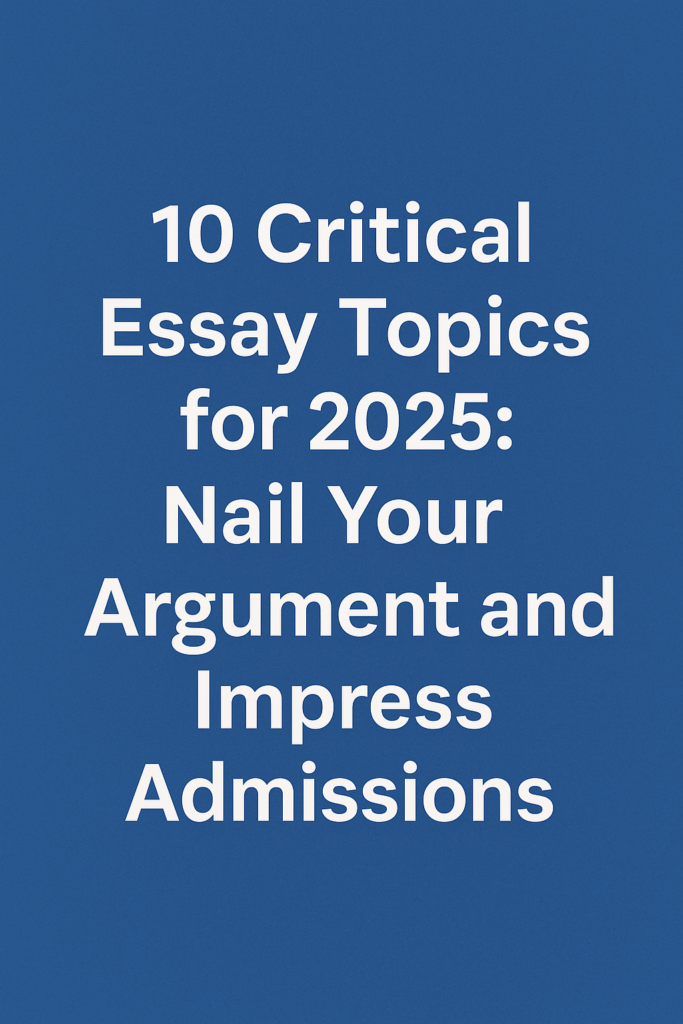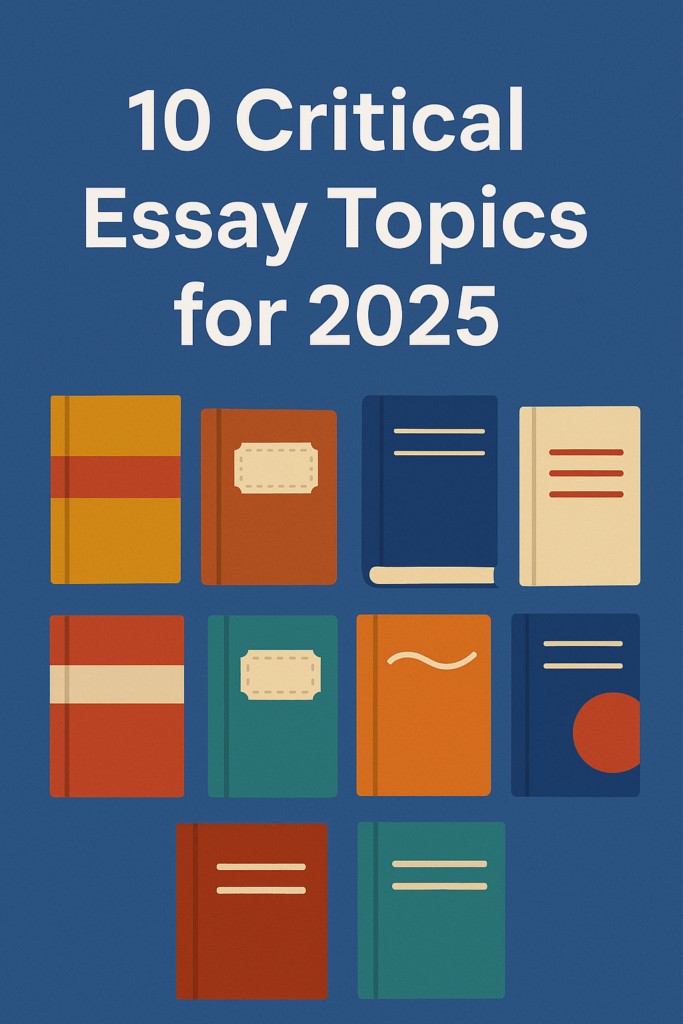Posted: June 13th, 2025
10 Critical Essay Topics for 2025: Nail Your Argument and Impress Admissions

Introduction
Choosing the right essay topic is half the battle when it comes to crafting a compelling college admission or academic essay. In 2025, colleges and professors are looking for more than polished grammar—they want insight, originality, critical thinking, and depth. That’s why selecting a powerful essay topic is crucial for standing out from the crowd. Whether you’re applying to college, submitting a scholarship application, or tackling a class assignment, the right essay topic can help you shine.
In this comprehensive guide, we explore 10 critical essay topics for 2025 that are timely, thought-provoking, and ideal for showcasing your argumentative and analytical skills. Each topic is explained in depth, with suggestions on how to approach it and questions to help you get started. Let’s dive in.

1. The Rise of Artificial Intelligence: Threat or Opportunity? (Approx. 250 words)
Artificial Intelligence (AI) is evolving rapidly and becoming part of our daily lives. From ChatGPT to self-driving cars, AI has sparked debates in education, business, healthcare, and beyond. Is it helping society, or is it a threat to jobs, privacy, and ethics?
This essay topic allows you to:
- Analyze both the benefits and risks of AI
- Explore ethical concerns, such as data privacy and machine bias
- Argue for responsible AI development and regulation
Pro tips for writing:
- Use real-life examples (e.g., AI in hiring, education, or law enforcement)
- Include expert opinions or recent research
- Offer a nuanced conclusion that balances innovation with caution
Questions to explore:
- Should AI replace human decision-making?
- What safeguards should be in place to ensure ethical use?
- How will AI affect future jobs and education?
This topic gives room for both personal reflection and objective analysis, making it a top contender for argumentative essays in 2025.
2. Should College Be Free for All? (Approx. 250 words)
With the rising cost of higher education, the debate over free college continues to grow. Advocates argue that education is a right, not a privilege, while critics worry about economic sustainability and declining academic quality.
This topic is ideal for students who:
- Want to discuss economic inequality
- Are interested in education policy or government reform
- Enjoy writing persuasive, evidence-based essays
How to approach it:
- Present both sides: free education vs. traditional tuition models
- Cite case studies (e.g., Germany or Sweden’s free university systems)
- Include potential benefits: increased access, reduced debt
- Acknowledge possible downsides: higher taxes, overcrowding
Questions to explore:
- How would free college be funded?
- Would it improve or lower the quality of education?
- Should it be available to all, or only low-income students?
This topic is great for showing your ability to engage with current events and analyze policy implications.
3. Climate Change Responsibility: Who Should Bear the Burden? (Approx. 250 words)
Climate change is no longer a future issue—it’s a present-day crisis. But who should take the lead in solving it? Should it be governments, corporations, or individuals?
This critical topic offers:
- A chance to explore global ethics and environmental science
- Room for persuasive argument and policy analysis
- An opportunity to link local actions to global outcomes
Key angles to consider:
- The role of developed vs. developing nations
- Corporate responsibility vs. personal lifestyle changes
- Climate justice and the impact on vulnerable populations
Ideas for supporting evidence:
- Data on carbon emissions by country or industry
- Real-world case studies (e.g., COP summits, Greta Thunberg’s activism)
- Scientific consensus from bodies like the IPCC
This topic allows for in-depth discussion and showcases your awareness of global issues and responsibility.
4. The Future of Remote Learning: Temporary Fix or Permanent Change? (Approx. 250 words)
The pandemic revolutionized education by making online learning mainstream. As campuses reopen, the debate rages: Should remote learning remain a major part of education?
Points to explore:
- Accessibility vs. engagement
- Mental health and social isolation
- Educational quality and technology gaps
This topic is perfect for:
- Reflecting on your own learning experience
- Exploring educational psychology and digital infrastructure
- Suggesting policy improvements
Guiding questions:
- Is remote learning equally effective for all age groups?
- How can we make it more interactive and inclusive?
- Will it widen or close the education gap?
You can write a compelling essay by combining personal anecdotes with credible research and policy suggestions.
5. Cancel Culture: Social Accountability or Digital Mob Justice? (Approx. 250 words)
Ways to tackle this topic:
- Define cancel culture and its origins
- Explore case studies involving celebrities or public figures
- Discuss the impact on free speech and mental health
Points to argue:
- The importance of accountability in public life
- The dangers of online outrage and mob behavior
- How cancel culture affects marginalized communities differently
Suggested structure:
- Begin with a recent cancellation case
- Analyze both sides of the argument
- Suggest alternatives: restorative justice, education
This topic challenges you to navigate complex social issues and express a well-balanced, informed opinion.
6. The Role of Social Media in Modern Democracy (Approx. 250 words)
From election interference to misinformation, social media has deeply affected how modern democracies function. Is it a platform for political engagement or a tool for manipulation?
Key themes to include:
- Freedom of speech vs. censorship
- Algorithms and echo chambers
- Political activism and youth engagement
Supporting sources might include:
- Reports on Facebook’s algorithmic influence
- Stats on Twitter’s political discourse
- Studies on youth voter turnout linked to online campaigns
Questions to explore:
- Should social media platforms be regulated?
- How does misinformation spread and how can it be stopped?
- Are digital platforms helping or hurting democracy?
This essay topic demonstrates your grasp of civic responsibility, media literacy, and modern political challenges.
7. Should Genetically Modified Foods Be Banned? (Approx. 250 words)
GMOs (Genetically Modified Organisms) remain a divisive issue. Supporters argue they help solve food scarcity, while critics worry about health and environmental risks.
In this essay, you can:
- Explain how GMOs work and where they’re used
- Evaluate both the benefits and dangers
- Discuss labeling laws and consumer choice
Questions to consider:
- Are GMOs safe for long-term human consumption?
- Do they help or harm biodiversity?
- Should consumers have a right to know what they’re eating?
Include scientific research, case studies (e.g., Bt corn or Golden Rice), and public opinion polls to support your argument.
8. Should Voting Be Mandatory? (Approx. 250 words)
Some countries, like Australia and Belgium, require citizens to vote. Would making voting mandatory improve democracy—or infringe on personal freedom?
Pros of this essay topic:
- Allows for political, ethical, and civic engagement analysis
- Explores global governance and electoral behavior
Points to address:
- Civic duty vs. individual rights
- Voter turnout statistics
- Potential impact on election outcomes
Structure tips:
- Start with global comparisons
- Explore practical outcomes and philosophical questions
- Propose solutions like voter education or incentives
This topic lets you flex your argumentative writing muscles while showcasing your knowledge of global democratic systems.
9. Should High School Students Work Part-Time Jobs? (Approx. 250 words)
Balancing school and part-time work is a common challenge for students. But is working during high school beneficial—or a barrier to academic success?
Key points to explore:
- Time management and academic performance
- Life skills like responsibility and financial literacy
- Mental health and burnout
Essay approach:
- Include statistics and personal experiences
- Present studies from education experts
- Weigh pros and cons
Guiding questions:
- How many hours per week is appropriate?
- Should schools partner with local businesses for internships?
- Are some students pressured into working out of necessity?
This topic is relatable, and combining your personal experience with evidence can make your essay highly persuasive.
10. Should Standardized Testing Be Abolished? (Approx. 250 words)
SATs, ACTs, and other standardized tests have long been a cornerstone of college admissions—but many institutions are rethinking their relevance.
Argument points:
- Racial and economic disparities in test results
- Stress and test anxiety
- Are grades and portfolios better indicators of success?
Structure suggestions:
- Introduce the current debate and context
- Analyze how tests affect different student populations
- Offer alternatives (e.g., holistic admissions, project-based evaluations)
Questions to explore:
- Does standardized testing measure intelligence accurately?
- How has test-optional policy impacted college admissions?
- What role does test prep play in the process?
This topic is perfect for students passionate about education reform, mental health, and equity.
Conclusion: Pick a Topic That Speaks to You
Each of these 10 critical essay topics for 2025 is designed to help you write an insightful, powerful, and original piece. When choosing your topic, remember to consider:
- Your genuine interest and passion
- How much you know (or want to learn) about the topic
- The balance of perspectives you can explore
Great essays are not just well-written—they’re well-thought-out. They challenge the reader, provoke reflection, and say something meaningful.
So, pick a topic that resonates with you, gather your research, and start writing. And if you need professional writing help to fine-tune your draft or brainstorm the perfect hook, WriteMastersPro.com is here to guide you every step of the way.
Your next powerful essay begins with the right topic—make it count.
Expert paper writers are just a few clicks away
Place an order in 3 easy steps. Takes less than 5 mins.